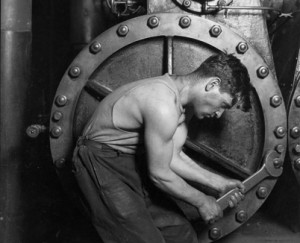From the Book of Ben Sira:
The wisdom of the scribe depends on the opportunity of leisure;
only the one who has little business can become wise.
How can one become wise who handles the plough,
and who glories in the shaft of a goad,
who drives oxen and is occupied with their work,
and whose talk is about bulls?
(From the Daily Office Lectionary – Sirach 38:24-25 – November 5, 2012)
 A few years ago I used this text in an affirmative way at a mass in celebration of our country’s legal system and those who practice law at the bar or sit on the bench as judges, but as I reflect on this text today, I find it unacceptably elitist. Although in subsequent verses Ben Sira extolls the diligence and care taken by craftspeople and laborers, those who “rely on their hands, and all [who] are skilful in their own work,” (v. 31) he conludes that they “do [not] understand the decisions of the courts; they cannot expound discipline or judgement.” (v. 33) Workers cannot be wise in his estimation!
A few years ago I used this text in an affirmative way at a mass in celebration of our country’s legal system and those who practice law at the bar or sit on the bench as judges, but as I reflect on this text today, I find it unacceptably elitist. Although in subsequent verses Ben Sira extolls the diligence and care taken by craftspeople and laborers, those who “rely on their hands, and all [who] are skilful in their own work,” (v. 31) he conludes that they “do [not] understand the decisions of the courts; they cannot expound discipline or judgement.” (v. 33) Workers cannot be wise in his estimation!
I disagree with Ben Sira. My late step-father was a skilled craftsman whom Ben Sira would have written-off as a manual laborer incapable of gaining wisdom. He was a tool-and-die maker; he was also one of the wisest men I’ve ever known. We often disagreed on matters of politics or economics, but in regard to the ways of getting on with people, being of service to his community, and respecting and caring for his friends, I looked up to him as to no other.
I rather think St. Benedict of Nursia also would have disagreed with Ben Sira! He required manual labor of his monks. Chapter 48 of the Rule of Benedict provides:
Idleness is the enemy of the soul. Therefore, the brothers should have specified periods for manual labor as well as for prayerful reading. We believe that the times for both may be arranged as follows: From Easter to the first of October, they will spend their mornings after Prime till about the fourth hour at whatever work needs to be done. From the fourth hour until the time of Sext, they will devote themselves to reading. But after Sext and their meal, they may rest on their beds in complete silence; should a brother wish to read privately, let him do so, but without disturbing the others. They should say None a little early, about midway through the eighth hour, and then until Vespers they are to return to whatever work is necessary. They must not become distressed if local conditions or their poverty should force them to do the harvesting themselves. When they live by the labor of their hands, as our fathers and the apostles did, then they are really monks. Yet, all things are to be done with moderation on account of the fainthearted.
Those who work with their hands, who do what my maternal grandfather (a professional barber) would have called “an honest day’s work,” learn many things. First, they learn to identify priorities; they have a goal to achieve and learn to do things in an appropriate order to accomplish it. Second, they learn the value of cooperation with others; helping a co-worker in need, picking up the slack when someone else is unable to work, accepting the assitance of others, all of these are learned when working with others. Third, they learn essential skills transferable between jobs: time management, communication, coping with stress, creative thinking, problem solving techniques. I learned lessons such as these from my grandfather and from my step-father.
Ben Sira is, frankly, wrong. Manual labor or working at a craft are wonderful schools for wisdom; I think this is why St Benedict required it of his monks. It is certainly why my grandfather and my step-father were such wise men.
====================
A request to my readers: I’m trying to build the readership of this blog and I’d very much appreciate your help in doing so. If you find something here that is of value, please share it with others. If you are on Facebook, “like” the posts on your page so others can see them. If you are following me on Twitter, please “retweet” the notices of these meditations. If you have a blog of your own, please include mine in your links (a favor I will gladly reciprocate). Many thanks!
====================
Father Funston is the rector of St. Paul’s Episcopal Church, Medina, Ohio.



Leave a Reply